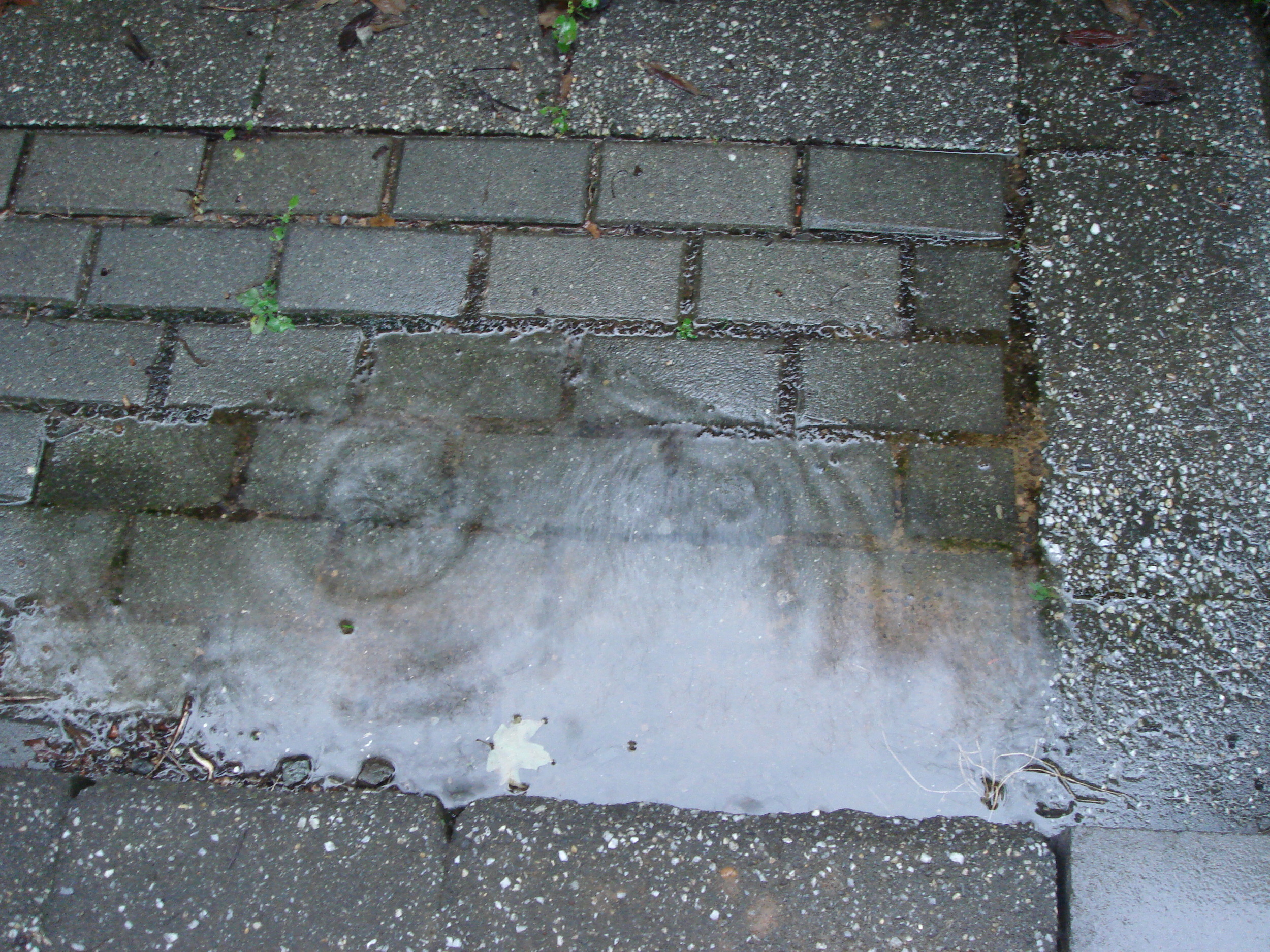 The beauty in this gray rainy day today lies in its perfection. It is not bad weather, rather it simply is, and it is perfect. While we consider it something like an opposite to a sunny day with blue skies, it helps to see it instead in a more holistic way, as the flipside of the same thing as the sunny day.
Take night and day as an example. The concept of night is totally intertwined with the concept of day. They do not exist in isolation. And both are continuously on their way towards each other. Day is always on its way towards night, and night is always on its way towards day. They are not mutually exclusive, and one is not better or worse than the other. They both simply are an aspect of each other, and therein lies the perfection.
The beauty in this gray rainy day today lies in its perfection. It is not bad weather, rather it simply is, and it is perfect. While we consider it something like an opposite to a sunny day with blue skies, it helps to see it instead in a more holistic way, as the flipside of the same thing as the sunny day.
Take night and day as an example. The concept of night is totally intertwined with the concept of day. They do not exist in isolation. And both are continuously on their way towards each other. Day is always on its way towards night, and night is always on its way towards day. They are not mutually exclusive, and one is not better or worse than the other. They both simply are an aspect of each other, and therein lies the perfection. 
the heart as a portal, not as a pump
This past week-end my meditation teacher equated the heart with a portal, a portal to within, a portal to infinite self-love and compassion. Rudolf Steiner said over a century ago that our human destiny would change once we recognized that the heart is not a pump. There are two interesting articles on that, one by Thomas Cowan, MD and the other by researchers from Temple University. Both articles refute the pump idea from the perspective of fluid dynamics and propose an alternate way of understanding the heart. Perhaps rearranging this understanding of the mechanics will lead us to recognizing our interface with the spiritual.
Consider our cultural symbolism of the heart as the center of love, as an expression of our compassion. I like the portal analogy, especially after reading Harry Potter and its many portals, unassuming gateways to much larger realities, unrecognized and untapped by those not in the know.
Food for thought indeed.
life's yummy factor
Holistic comes from whole and also holy and means that something includes both the qualitative and the quantitative, seen and unseen, physical and metaphysical aspects. Our culture is a bit lopsided because it has favored the quantitative aspect of science over the spiritual aspect at least since Isaac Newton. But the qualitative aspect, the spiritual, the unseen, is what adds the yummy factor to life. Knowledge of the calories of a strawberry, or its vitamin content, is pretty dull and meaningless without the smell of the ripe fruit, the visual appreciation of its red ripeness, the feeling of the teeth sinking into the juicy flesh, and finally that distinct sweet strawberry taste on the tongue.
The yummy factor is what makes life worth living.
yum - raw milk
Our cats love the cream from the top of the milk. Not only cats digest raw milk, which has neither been pasteurized nor homogenized, better than the processed version. Many people, who are supposedly lactose intolerant, also have an easier time digesting milk the way nature made it. The health benefits of raw milk versus its processed compromised poor cousin are tremendous.  Today was our milk pick-up day. We take turns with a few other local families, coop style, picking raw milk directly up from the (currently) only dairy farm in Orange County approved to sell raw milk by the Department of Health. So we actually get to meet the cows that provide us with our milk.
Today was our milk pick-up day. We take turns with a few other local families, coop style, picking raw milk directly up from the (currently) only dairy farm in Orange County approved to sell raw milk by the Department of Health. So we actually get to meet the cows that provide us with our milk.
Personally, I love the cream on top even more than the milk. On the photo you can see how much cream comes with a ½ gallon of milk, more than a cup. I use it for making ice cream, deglazing, in quiche, and as a treat for our cats.
Yum - raw milk!
love those germs
Enough fighting already! We fight too much – enemies, wars, illnesses, death. They are all simply another aspect of the same thing. Balance, not eradication, is the answer. A little dirt, a little dust, a healthy amount of bacteria is actually good for you. Most of us know by now about the drawbacks of antibiotics – those indiscriminate bacteria killers prescribed much too liberally to humans and animals over the past decades in an effort to kill all the “bad” bacteria. A new book was recently published on the possible relationship between our modern germ killing frenzy and the surge in recent civilization and autoimmune diseases, possibly even autism.
A little dirt, a little dust, a healthy amount of bacteria is actually good for you. Most of us know by now about the drawbacks of antibiotics – those indiscriminate bacteria killers prescribed much too liberally to humans and animals over the past decades in an effort to kill all the “bad” bacteria. A new book was recently published on the possible relationship between our modern germ killing frenzy and the surge in recent civilization and autoimmune diseases, possibly even autism.
So eat your yoghurt, sauerkraut, kimchi and pickles (naturally fermented, not the supermarket vinegar kind), drink your kefir, kombucha, wine, beer or mead, and clean your home and body with gentle and natural cleaning and cleansing products instead of those germ killing antibacterial soaps and cleaners.
wordlessness
 I admit, I did not get it for a long time, the “don’t think,” “drop into your heart space” or “count from 1 to 10 and then start over” effort to get “out of my mind.” Finally I did get it when I recently read Martha Beck’s new book Finding Your Way In A Wild New World. Martha spoke about dropping into “wordlessness.” That’s it! Somehow I understood that analogy a lot better than all of the others and a lightbulb went off. It’s as if there was a word world floating in, around and above us that engulfs us. We name everything, categorize everything, judge everything, and clad everything into words. However, words lock our experience, our vision into our individual perspective with our particular set of emotions attached to it. On the other hand when you drop out of that framework by leaving the words by the wayside everything simply is the way it is – it is not tinted with the meaning of words. When I slip out of this word cloud that surrounds me I find myself in a space where there is only feeling, seeing, sensing, being. That world is devoid of anxiety, anger, and all of the other negative emotions, because those arise only out of the connection between words, past experience and future expectations.
Try it sometime!
I admit, I did not get it for a long time, the “don’t think,” “drop into your heart space” or “count from 1 to 10 and then start over” effort to get “out of my mind.” Finally I did get it when I recently read Martha Beck’s new book Finding Your Way In A Wild New World. Martha spoke about dropping into “wordlessness.” That’s it! Somehow I understood that analogy a lot better than all of the others and a lightbulb went off. It’s as if there was a word world floating in, around and above us that engulfs us. We name everything, categorize everything, judge everything, and clad everything into words. However, words lock our experience, our vision into our individual perspective with our particular set of emotions attached to it. On the other hand when you drop out of that framework by leaving the words by the wayside everything simply is the way it is – it is not tinted with the meaning of words. When I slip out of this word cloud that surrounds me I find myself in a space where there is only feeling, seeing, sensing, being. That world is devoid of anxiety, anger, and all of the other negative emotions, because those arise only out of the connection between words, past experience and future expectations.
Try it sometime!
why eat organic?
 The stale and narrow premise that what distinguishes organic from non-organic foods is simply their nutritional content is on the table again in today’s NY Times article by Kenneth Chang about a new megastudy to that effect. But, as Sonya Lunder,a senior analyst with the Environmental Working Group stresses, many who buy organic foods are aware of the complexity of issues beyond mere nutritional aspect.
The nutrition debate leaves, as in the past, a whole host of other reasons why to buy organics off the table. Besides ingesting less residual toxins from pesticides buying organic groceries, produce, meat and fish means choosing the health of the environment and biodiversity over sprayed monocultured fields, it means voting for the health of the farmworkers so they don’t get exposed to toxic pesticides and herbicides, in the case of meat and fish it means choosing not to ingest antibiotics and surface bacteria (another relevant article in today's paper), it also means voting against genetically modified plants and animals, and it means choosing the more humane tending to, raising and slaughtering of animals for meat. Lastly, if buying from a nearby farm, choosing organic is linked to choosing local over global.
The stale and narrow premise that what distinguishes organic from non-organic foods is simply their nutritional content is on the table again in today’s NY Times article by Kenneth Chang about a new megastudy to that effect. But, as Sonya Lunder,a senior analyst with the Environmental Working Group stresses, many who buy organic foods are aware of the complexity of issues beyond mere nutritional aspect.
The nutrition debate leaves, as in the past, a whole host of other reasons why to buy organics off the table. Besides ingesting less residual toxins from pesticides buying organic groceries, produce, meat and fish means choosing the health of the environment and biodiversity over sprayed monocultured fields, it means voting for the health of the farmworkers so they don’t get exposed to toxic pesticides and herbicides, in the case of meat and fish it means choosing not to ingest antibiotics and surface bacteria (another relevant article in today's paper), it also means voting against genetically modified plants and animals, and it means choosing the more humane tending to, raising and slaughtering of animals for meat. Lastly, if buying from a nearby farm, choosing organic is linked to choosing local over global.
So, buying organics is a vote for a multitude of betterments, not simply a choice for more nutritious food.
